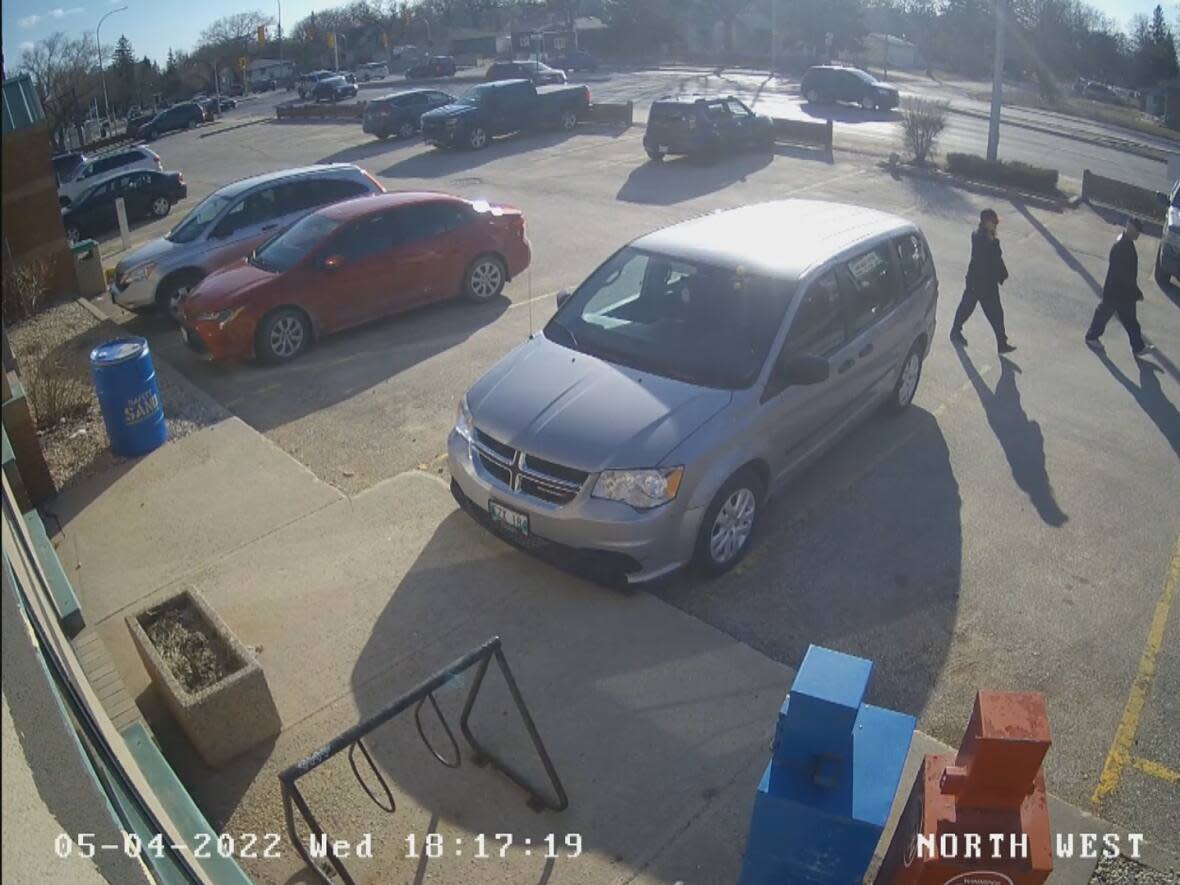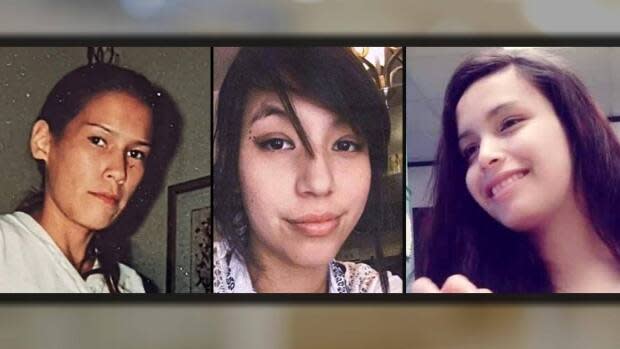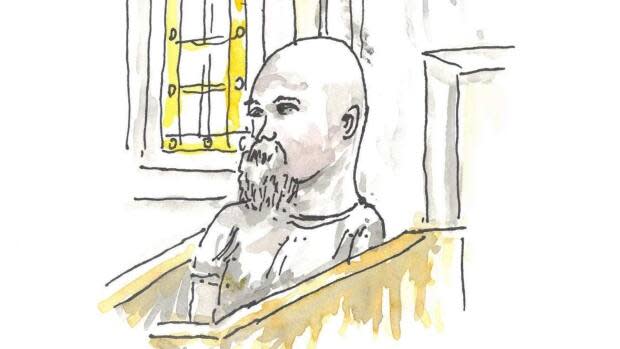Winnipeg serial killer seen with victims in video footage played at trial

WARNING: This story contains distressing details.
A Winnipeg man who admits to killing four women in 2022 was seen on video surveillance footage with some of them in the days and hours before they died — including eating a meal at a shelter, buying groceries and walking through a parking lot near the apartment where he later killed the women, his trial heard Monday.
Those moments were among more than 2,000 hours of surveillance video seized during the Winnipeg police investigation into Jeremy Skibicki, 37, Sgt. Paul Barber testified Monday morning before a courtroom where some of the women's family members sat and listened.
Skibicki has pleaded not guilty to first-degree murder in the deaths of Rebecca Contois, Morgan Harris, Marcedes Myran and a fourth woman whose identity still isn't known but who is believed to have been Indigenous and in her 20s. She has been given the name Mashkode Bizhiki'ikwe, or Buffalo Woman, by community members.
His lawyers argue he should be found not criminally responsible for the deaths due to a mental disorder.
Contois was a member of O-Chi-Chak-Ko-Sipi First Nation, also known as Crane River, on the western shore of Lake Manitoba. Harris and Myran were both members of Long Plain First Nation in south-central Manitoba.
Skibicki unexpectedly confessed to killing all four women when police questioned him after his arrest in May 2022. During his interrogation, Skibicki detailed how he killed each woman and then put their remains in the trash.

Prosecutors have said the women's deaths were "intentional, purposeful and racially motivated," and alleged the accused preyed on vulnerable Indigenous women at Winnipeg homeless shelters.
Video played in court on Monday showed Skibicki disposing of the women's remains under the cover of darkness in garbage bins in a back lane not far from his North Kildonan apartment.
"They were not garbage," the grandmother of one of the women said in Skibicki's direction, as he was escorted out of the courtroom during a break.
Accused seen at shelter, grocery shopping
One of the earliest pieces of video surveillance police found was of Skibicki eating a meal with Harris at a homeless shelter on April 30, 2022 — one day before police say they believe she was killed.
Police also got video from that following night of Harris leaving the shelter after getting kicked out, court heard.
WATCH | Surveillance video shown in court of Skibicki with Morgan Harris:
The video shows her wearing some of the same clothes that police later found when they searched Skibicki's apartment and nearby garbage bins for evidence after Contois's partial remains were found in bins near his home.
Another video taken after police believe Harris was killed shows Skibicki in the back lane where he later told police he'd disposed of her body.
In that video from the night of May 3, court heard, he was seen wheeling a residential garbage bin up to a commercial dumpster and emptying its contents — which appear to be wrapped in black plastic — inside.
Court also heard police identified Myran using surveillance footage and information from Skibicki's police confession about where he met her and what she was wearing. Skibicki told police he didn't know her name.
WATCH | Surveillance video shown in court of Skibicki with Marcedes Myran:
Other video police found showed Skibicki leaving the shelter where he had been seen earlier with Harris, then going to catch a bus with Myran. Skibicki and Myran are then seen walking through a parking lot together near his apartment on May 4, 2022 — the same day police say they believe he killed her.
The hat and shoes she was seen wearing in those videos were also later recovered by police during their search of Skibicki's apartment, court heard.
Another video played in court from the night of May 6, 2022, showed Skibicki again pulling a wheeled garbage bin to empty its contents into the same dumpster where prosecutors say he put Harris's remains.
Court heard Skibicki was also seen on surveillance video with Contois several times in early May 2022, including one evening when they were seen shopping for groceries together. Sgt. Barber testified police determined Skibicki had also requested to have her added to the lease for his apartment.
No video found of unidentified victim
Police found Contois' partial remains at the city-run Brady Road landfill after finding her other remains in garbage bins near Skibicki's apartment about a month earlier. Police believe Harris's and Myran's remains are at the Prairie Green landfill outside Winnipeg, while the location of Mashkode Bizhiki'ikwe's remains is not known.
Additional videos played in court Monday show Skibicki walking down back lanes near his apartment on the night of May 15, 2022 — just after police believe he killed Contois.

He's seen at one point again rolling a residential garbage bin behind him, and at other points carrying a large black duffel bag over his shoulder and dropping something that appears to be in a white plastic bag into a garbage bin, court heard.
Sgt. Barber said police were never able to find surveillance video to help identify the unknown woman Skibicki admitted to killing. He said by the time Skibicki confessed to police in May, it had already been roughly two months since the woman is believed to have been killed — and most surveillance footage gets overwritten after a few weeks.
The sergeant said the investigation into that woman's identity is still ongoing, and police are continuing to look into Skibicki's past and relationships for clues.
"We have continued to try and follow up on any leads that we receive from the public with regards to the identity of Buffalo Woman," Barber said.
Skibicki's defence team didn't cross-examine Barber, who was the only witness called Monday.
The judge-alone trial before Court of King's Bench Chief Justice Glenn Joyal is scheduled to continue Tuesday with testimony from a DNA expert. The trial is expected to last until June 6.
Support is available for anyone affected by these reports and the issue of missing and murdered Indigenous people. Immediate emotional assistance and crisis support are available 24 hours a day, seven days a week through a national hotline at 1-844-413-6649.
You can also access, through the government of Canada, health support services such as mental health counselling, community-based support and cultural services, and some travel costs to see elders and traditional healers. Family members seeking information about a missing or murdered loved one can access Family Information Liaison Units.


